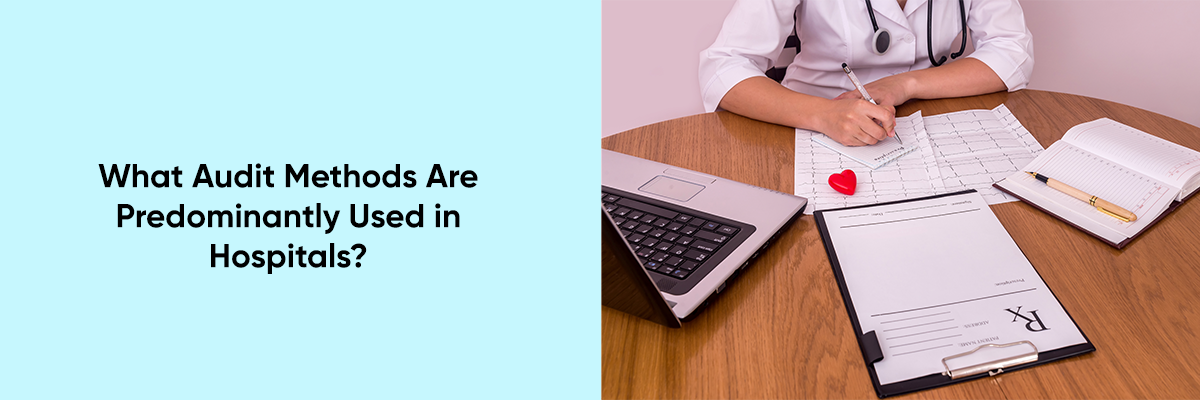In the healthcare sector, audits are essential for maintaining regulatory compliance, boosting operational efficiency, and elevating patient care standards. A well-executed audit process helps identify potential risks, uncover areas of non-compliance, and enhance financial performance.
In this blog we will look into the predominant audit methods used in hospitals, offering insights into how these techniques play a pivotal role in ensuring a smoothly functioning healthcare system.
Understanding these audit methods is key to mastering the audit process and achieving overall excellence in healthcare management.



1. Documentation Reviews
Documentation reviews are a fundamental audit method in hospitals. This process involves examining patient records, medical charts, and other relevant documents to ensure accuracy and compliance with healthcare regulations. Auditors check for completeness, proper coding, and adherence to billing guidelines. Proper documentation is essential for accurate reimbursement and maintaining patient care standards.
2. Coding Reviews
Coding reviews focus on the accuracy and appropriateness of medical coding. This method involves analyzing the codes assigned to diagnoses, treatments, and procedures. Coders use these codes for billing and insurance claims, making it crucial to verify their accuracy to avoid errors and potential audits. Accurate coding ensures that hospitals receive appropriate reimbursements and comply with payer requirements.
3. Revenue Cycle Reviews
Revenue cycle reviews evaluate the entire process of patient revenue management, from registration to billing and collection. This method assesses how efficiently a hospital handles claims processing, payment collections, and denial management. By identifying bottlenecks and inefficiencies in the revenue cycle, hospitals can improve cash flow and reduce operational costs.
4. Internal Audits
Internal audits are conducted by hospital staff or internal auditors to evaluate compliance with internal policies and procedures. These audits help identify weaknesses and areas for improvement within the hospital’s operations. Internal audits focus on various aspects, including financial management, clinical practices, and administrative processes.
5. External Audits
External audits are performed by independent third-party auditors. These audits provide an objective assessment of a hospital’s financial statements, compliance with regulations, and overall performance. External audits are essential for maintaining transparency and accountability, as they offer an unbiased evaluation of the hospital’s operations.
6. Compliance Audits
Compliance audits ensure that hospitals adhere to regulatory requirements and industry standards. These audits focus on verifying compliance with laws such as the Health Insurance Portability and Accountability Act (HIPAA) and other healthcare regulations. Compliance audits help prevent legal issues and safeguard patient information.
7. Quality Audits
Quality audits assess the effectiveness of healthcare services and patient care processes. This method involves reviewing clinical outcomes, patient satisfaction, and adherence to clinical guidelines. Quality audits aim to improve patient outcomes and enhance the overall quality of care provided by the hospital.
Professional Fee Audits:
These audits delve into physician billing practices, reviewing documentation, coding, and the overall revenue cycle. They aim to identify any discrepancies or areas where coding might be inaccurate.
Understanding the Benefits of Audits
Regular hospital audits offer a multitude of benefits:
- Enhanced Financial Accuracy: Audits help identify and rectify billing errors, leading to more accurate financial reporting.
- Improved Operational Efficiency: By identifying areas for improvement in processes, audits can streamline operations and reduce costs.
- Reduced Risk of Fraud: A strong audit program can deter fraudulent activity and ensure proper use of healthcare funds.
- Better Patient Care: Audits that focus on areas like documentation and coding accuracy can indirectly improve patient care quality.
Effective audit practices are crucial for hospitals. By conducting various types of audits regularly—such as internal audits to address discrepancies and compliance issues—hospitals can preemptively resolve potential problems. This proactive approach helps them avoid external audits by agencies like the IRS, reducing the risk of scrutiny and potential penalties. Consistent and thorough auditing not only ensures regulatory compliance but also supports a hospital’s overall financial health and operational integrity.
Conclusion
Hospital audits are crucial for maintaining financial stability, ensuring compliance, and delivering high-quality patient care. By understanding and implementing various audit methods, healthcare institutions can enhance operational efficiency, improve financial performance, and optimize patient care.
Regular audits help hospitals stay compliant with regulations, streamline their revenue cycles, and continuously strive for improvement in their services.


